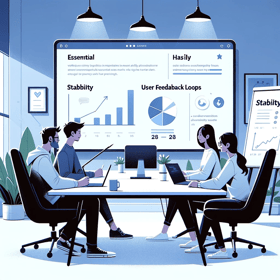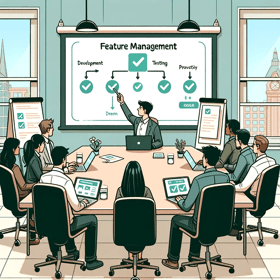.png?width=1792&height=1024&name=MicrosoftTeams-image%20(2).png)
Cittros Application Lifecycle Management is your guide to a proactive and stable D365FO environment, leaving you to focus on your customers.
The PDF includes details for Cittros Application Lifecycle Management for Microsoft Dynamics 365 for Finance, Supply Chain Management & Commerce.
.jpg?width=280&height=280&name=1.%20Deployment%20process%20for%20an%20ALM%20cycle%20(moving%20in).jpg)
Preparing for software deployment involves laying the groundwork that will support the seamless operation of a digital system. Just as a solid foundation is vital for a house to withstand the test of time, a robust technological foundation ensures the software operates reliably and efficiently. We at Cittros like to focus on proactiveness and forward-thinking, therefore we are presenting you with a schedule of possible dates through which the ALM can take place. Knowing the schedule in advance gives you, as the client, the possibility to plan the needed resources for the testing phase. Also, you are introduced to the new features that are coming during future ALM cycles, as well as discussing and deciding which of the planned changes will become part of the Dynamics 365 Finance and Operations (D365FO) Production environment.
Furthermore, the planning and coordination required for house construction and software deployment bear remarkable similarities. Both require clear objectives, definite timelines, and coordination among client and Cittros teams. Once the schedule and the deadlines are decided and all needed changes/new features are agreed, the organization of the deployment process may begin. Cittros will guide and help the client with the decision about the D365FO Production deployment, but we will also take care of the actual move (deployment) and the activities that need to be performed after settling in.
Imagine the day of the actual move into your new home. It is a day filled with anticipation and excitement. Everything must be orchestrated perfectly to ensure a smooth and efficient transition from one space to another. In much the same way, the deployment of software to a D365 F&O Production environment marks the moment when a software product is ready to transition from the controlled development and testing environments to the D365FO Production environment where it will be used by the end-users. Software deployment requires careful packaging, transfer, and installation of code and configurations. When working with D365 FO environments, these actions are performed in previously agreed servicing windows during which the environment cannot be used by the end users.
When you first move into a new house, you encounter the process of turning it into a home. This involves arranging your belongings, ensuring that everything functions as expected, and making the necessary adjustments to create a space that aligns with your needs and preferences. The post-deployment operations are here to ensure that the D365FO Production environment runs smoothly, securely, and performance-wise efficiently. Cittros is maintaining and optimizing the environment by executing the cut–over activities in it. These can include setup changes, configuration changes, enablement/disablement of certain features etc.
This analogy helps shed light on the unities and challenges that the software deployment phase shares with the physical act of moving into a new space. It underscores the significance of a smooth transition, presenting a stable process which emphasizes the importance of thorough planning and execution to ensure a successful, concern-free "move" in the digital world.

Application Lifecycle Management (ALM) serves as the blueprint in the software development journey. Within this framework, the operations phase stands as a beacon, ensuring software thrives post-deployment. Cittros' approach uniquely emphasizes the synergy between us and the end users, fortified by deep knowledge and a proactive stance toward stability.
The operations phase is about more than just deployment; it's about ensuring software thrives in its intended environment. This phase ensures software not only functions but adapts and evolves based on real-world demands and feedback.
While traditional operations often react to issues as they arise, our ethos is rooted in detection and prevention. Our proactive approach ensures that software is primed to meet users' needs, resulting in fewer disruptions and a more harmonious user experience.
The true strength of our operations lies in the symbiotic relationship with the end users. Our deep industry knowledge allows us to understand user needs, while continuous feedback from users guides our strategies. This two-way relationship ensures that software is always aligned with user expectations.
In today's fast-paced digital world, stability is the cornerstone users rely on. Our commitment to stability ensures that software doesn't just run—it excels, providing users with a dependable and seamless experience.
Our operations are never static. Recognizing the dynamic nature of software, we've established robust feedback loops with our users. Their insights, combined with our expertise, ensure our strategies are always evolving and improving.
Our approach to the operations phase of ALM is deeply rooted in the synergy between our expertise and the invaluable feedback from end users. By combining proactive strategies with a keen understanding of user needs, we offer an unparalleled operational experience. Together, we ensure software not only survives but thrives.

At the core of our Application Lifecycle Management (ALM) process lies a commitment to proactivity and stability. Central to this commitment is our Feature Management Review, a thorough process designed to seamlessly integrate new features from Microsoft into your Dynamics 365 Finance and Operations (D365FO) Production environment.
Each release from Microsoft brings with it a bundle of new features. Our role is to demystify these features, helping you comprehend their potential impact on your system. We conduct thorough internal tests on relevant features, delving deep into their functionalities and implications. This proactive approach empowers us to provide you with comprehensive guidance, ensuring that your updates are smooth, and your D365FO Production environment remains stable.
Our in-depth knowledge of the platform, coupled with a profound understanding of our clients’ unique needs, positions us uniquely to filter through the features, selecting only those that hold relevance for your business processes. We personalize your reviews, tailoring them to your system, ensuring that we spotlight only the changes that matter to you.
Transparency is essential for our process. We strive to cultivate a sense of security and predictability, ensuring that you are well-informed and prepared for what lies ahead. While we cannot always circumvent disruptive changes, our proactive stance equips us to identify and address potential issues well in advance. This foresight allows us, and in turn, you, to adapt swiftly and efficiently, safeguarding the performance and stability of your D365FO Production environment.
Our Feature Management Review stands as a testament to our commitment to your success. We navigate the complexities of new Microsoft updates, ensuring that you are equipped with the knowledge and tools needed for a smooth transition. With us, you gain not just a service provider, but a partner dedicated to maintaining the stability and performance of your system, today and into the future.
.jpg?width=280&height=280&name=4.%20Implementing%20software%20enhancements%20during%20ALM%20cycle%20(renovation).jpg) Drawing an analogy between renovating a house and implementing software enhancements gives a unique perspective on improving and modernizing digital solutions. Both sides of the analogy start with assessing the current state, then identifying areas for improvement and planning modifications. These phases are some of the key values of the forward-thinking approach of the Cittros’ Application Lifecycle Management (ALM) process.
Drawing an analogy between renovating a house and implementing software enhancements gives a unique perspective on improving and modernizing digital solutions. Both sides of the analogy start with assessing the current state, then identifying areas for improvement and planning modifications. These phases are some of the key values of the forward-thinking approach of the Cittros’ Application Lifecycle Management (ALM) process.
When you assess the current state of your house, you begin by inspecting the structure, identifying areas that require attention, and gathering information about its layout, features, and functionality. In a parallel manner, evaluating the existing software system involves a comprehensive review of its current state. This includes an examination of the software's architecture, codebase, performance, security, and user feedback. This assessment provides the technical and functional teams from Cittros with a view inside the existing system and its functionalities, and it is a crucial step because it forms the foundation for making informed decisions about any renovations or remodeling.
In the realm of software, identifying the need for enhancements involves a thorough evaluation of the assessment done in the previous step. This assessment helps identify areas where enhancements or updates are needed to maintain the software's relevance, functionality, and user satisfaction. Understanding and analyzing users’ feedback, technological advancements, and evolving requirements are some of the forward-looking actions taken by Cittros to improve the overall user experience and performance of the Dynamics 365 Finance and Operations (D365FO) Production environment as the main target.
After identifying the areas for improvement, if a code change is required, then these changes (modifications) need to be promoted on the upper hierarchy environments to be tested. The promotion of the modifications is part of the ALM process, and it takes care of creating and installing a deployable package containing the most recent modifications. Once the client confirms that the modification/requirement works as intended, the modification can be promoted to the D365FO Production environment.
Both the house renovation and software enhancement processes require a forward-looking and forethoughtful perspective. It's about addressing not only current issues but also anticipating future needs. Just as a house renovation might include energy-efficient upgrades to meet future environmental standards, software enhancements might encompass future-proofing measures to accommodate evolving technology and user expectations.

Application Lifecycle Management (ALM) is the comprehensive roadmap guiding software from planning to retiring. Central to this journey is the testing phase, where software undergoes rigorous assessments. Our approach uniquely prioritizes automatic testing, fostering a strong bond with end users through proactive measures and an unyielding dedication to stability.
Testing is the bridge between a software's design and its real-world performance. Beyond manual evaluations, the power of automatic testing ensures software stands up to potential challenges, consistently aligning with user needs and expectations.
Automatic testing is the beacon of modern software validation. By simulating countless user scenarios and interactions, it offers unparalleled coverage and consistency.
This automation employs a comprehensive and systematic approach to uncover potential issues that users might encounter based on defined scenarios and patterns. Detecting issues faster, ensuring software is robust from the outset.
While automation offers breadth, our deep industry knowledge ensures depth. Understanding user behavior's, industry standards, and technological trends allows us to tailor our automatic tests, ensuring they are comprehensive, relevant, and aligned with real-world user scenarios.
Stability is the cornerstone of user trust. Automatic testing, with its repeatable and consistent evaluations, plays a pivotal role in ensuring software reliability. By continuously validating software under various conditions, we strive for a seamless and dependable user experience.
Embracing automation doesn't diminish our commitment to collaboration. On the contrary, automatic tests provide immediate, actionable feedback, allowing us to swiftly iterate based on user insights and maintain a dynamic dialogue with the end user community.
Our approach to the testing phase of ALM emphasizes the symbiotic relationship between deep expertise, automatic testing, and user collaboration. Through this harmonious integration, we champion software that is not only functionally robust but also deeply resonant with user expectations.

Application Lifecycle Management (ALM) is built on proactivity when it comes to your Dynamics 365 Finance and Operations (D365FO) system. With a simplified concept our ALM process also ensures that Quality Updates delivered each month by Microsoft are being tested before being applied to your D365FO Production system.
The commitment to ensure proactivity also covers D365FO quality updates. These quality updates are released by Microsoft each month containing hotfixes and enhancements for the ongoing version of your Production environment.
To ensure stability and improve the work quality of your D365FO Production environment, we install these updates and execute automatic testing (read more here) before applying them to your D365FO Production environment.
The proactivity in our ALM concept ensures that you are informed in advance before the quality updates are applied to your D365FO Production system. During the process of applying the quality updates, we will be keeping you informed of the status to ensure full insight into the process and make sure that the update is applied outside your business hours.
With Cittros Application Lifecycle Management Services, we proactively validate the quality updates released from Microsoft prior to these being applied to your D365FO Production environment. With this we ensure stability in your D365FO Production environment and proactive insight into when these quality updates will be applied.
More than a service, we offer a partnership, aligning our expertise closely with your business needs for seamless and effective Dynamics 365 Finance and Operations management.
Cittros can help you successfully deploy Dynamics 365.
Contact us for a free consultation